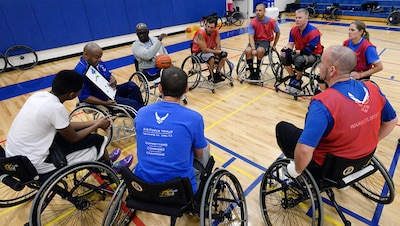By Air Force Staff Sgt. Micaiah Anthony III Marine
Expeditionary Force
SATTAHIP, Thailand, Feb. 23, 2018 — Sunlight peeks though
the tree tops as the Marines make their way through a dense and humid jungle.
Rations and water have been consumed -- there is no
opportunity for resupply for several days. The Marines are hungry and thirsty.
Yet, the Marines will continue on with their mission because
they’ve had jungle survival training.
American and South Korean Marines were taught jungle
survival skills by members of Thailand’s Marines here Feb. 19.
Learning Survival Skills
“Today we're teaching jungle survival to U.S. and [South]
Korea's reconnaissance Marines,” said Royal Thai Marine Corps Master Sgt.
Pairoj Prasansai, a jungle survival training instructor. “Survival is an
important skill for all troops to learn, especially troops who may only have
experience in urban combat but not in jungle survival.”
The class taught Marines basic skills to help them survive
and thrive in a hot, dangerous environment.
“The course curriculum teaches troops how to find water
sources, start fires, the differences in edible and nonedible vegetation and
finding vines suitable for consumption and hydrating.” Prasansai said. “They
also learn about dangerous animals and insects -- both venomous and nonvenomous
-- that are native to Thailand and are suitable to eat.”
Reconnaissance Marines gather vital intelligence and relay
information up to command-and-control centers, enabling leaders to act and
react to changes in the battlefield. Recon troops operate deep into enemy
territory with limited back up.
Marines get ready to eat a scorpion.
South Korea Marine Corps Staff Sgt. Choelryoong Wyang holds
a scorpion while U.S. Marine Corps Cpl. Alan Bounyasith, left, a 3rd Marine
Division, reconnaissance Marine from Marietta, Ga., and Marine Corps Sgt. Leo
Briseno, a 3rd Marine Division reconnaissance Marine from Corpus Christi,
Texas, prepare to eat a scorpion during jungle survival training in Sattahip,
Thailand, Feb. 19, 2018. The training was conducted as part of Exercise Cobra
Gold 2018. Air Force photo by Staff Sgt. Micaiah Anthony
“We fight at any time and place,” said Marine Corps Sgt.
Stephen South, who hails from Goodyear, Arizona, and is assigned to the 3rd Reconnaissance Battalion, 3rd Marine
Division. “This training can be used during recon if we find ourselves far away
from support options. Knowing what we can and can’t eat is very beneficial.”
Marines were given the opportunity to try some of the
fruits, vegetables, herbs, insects and animals that can be found in the jungle,
and were shown how to safely capture, handle and consume both venomous and
nonvenomous snakes.
Drinking Cobra Blood
“In the wilderness you can drink the blood of a snake to
stay hydrated,” Prasansai told the Marines as he picked up a cobra. “Snakes can
provide you with both the food and water you need to survive.”
After preparing the snake, students were given the
opportunity to drink the cobra’s blood.
“It tastes like blood with a hint of fish,” Marine Corps
Sgt. Christopher Fiffie, a 3rd Reconnaissance Battalion, 3rd Marine Division,
said.
Many students enjoyed the new experience and gained valuable
knowledge to help them in the field.
“I’ve never done anything like this before, and I didn’t
know you could eat most of those plants,” said Marine Corps Sgt. William
Singleton, who hails from Franklin, Georgia, and is assigned to the 3rd
Reconnaissance Battalion, 3rd Marine Division.
“Seeing the different animals that you can eat is pretty
mind-blowing. It will help us recognize [edible food sources] easier in the
wilderness,” Singleton added.









